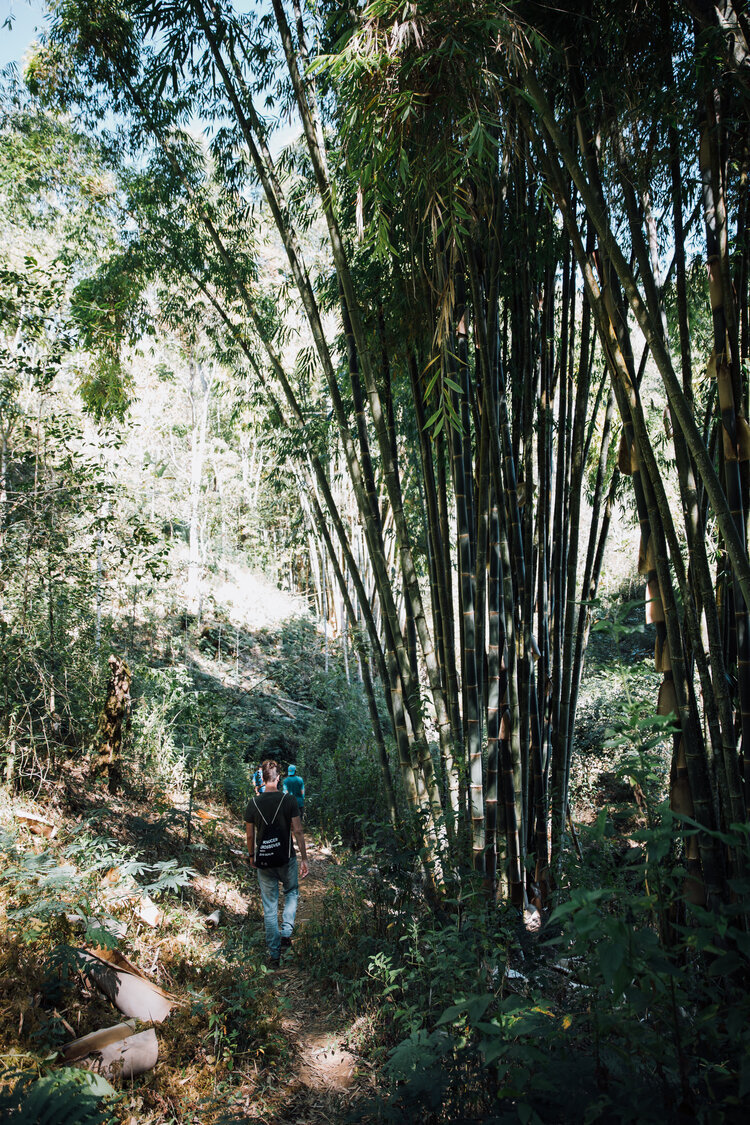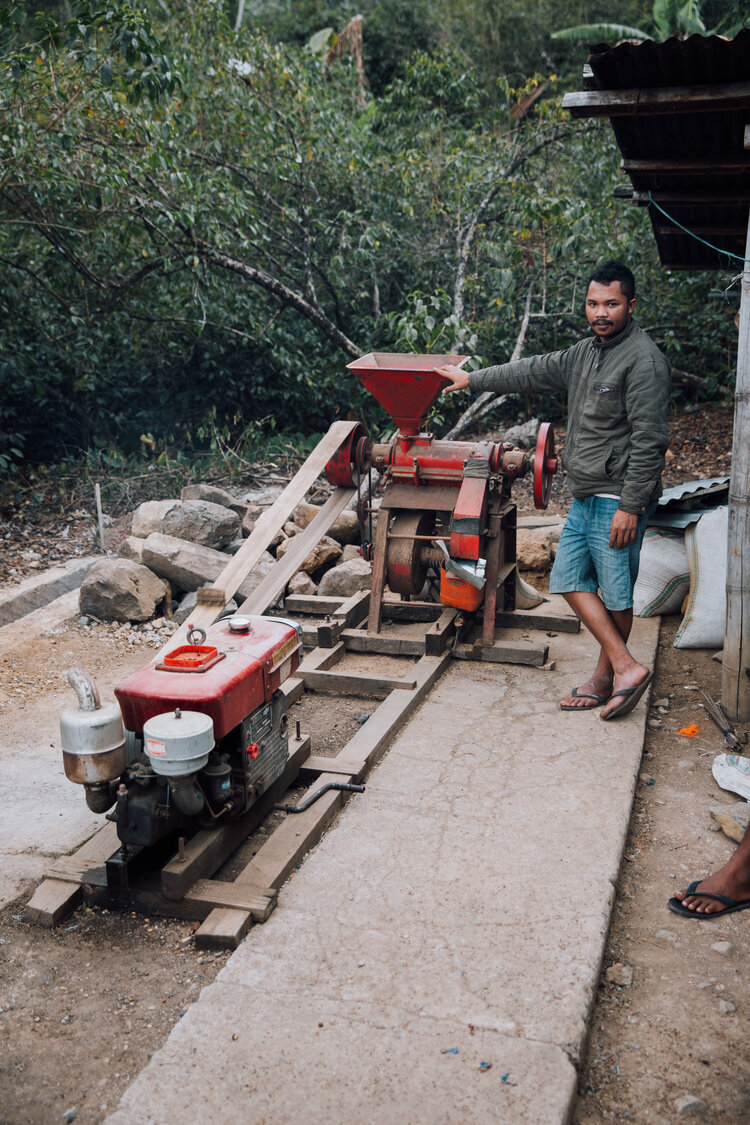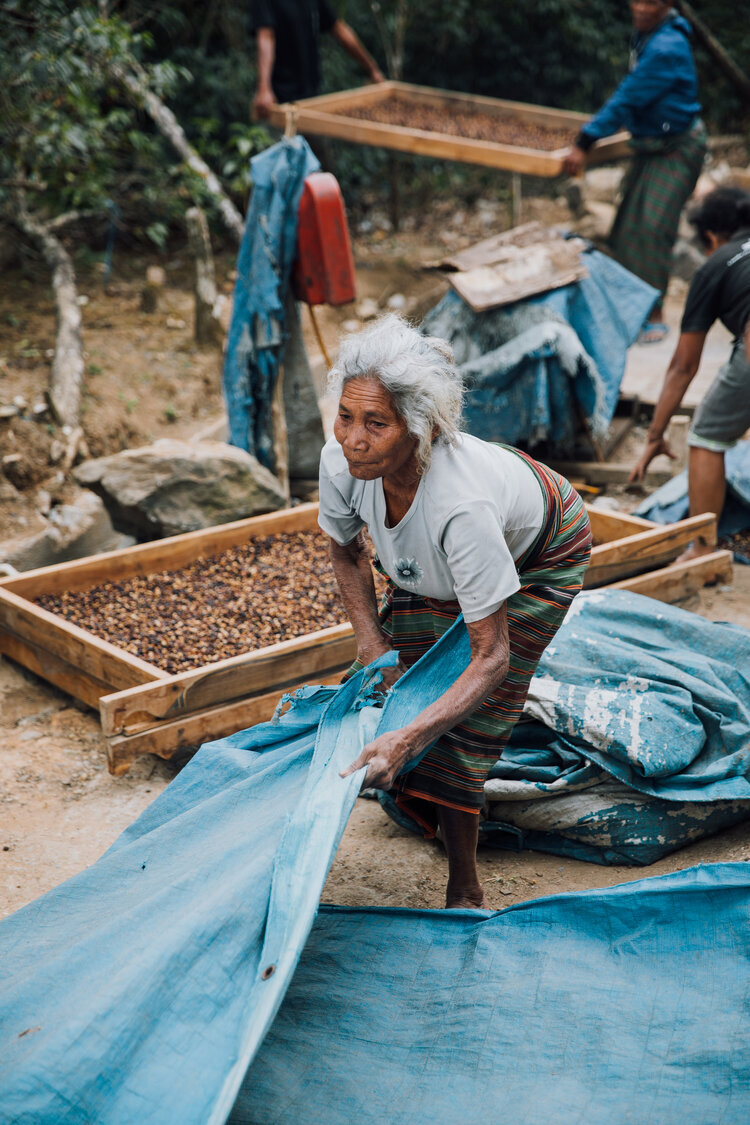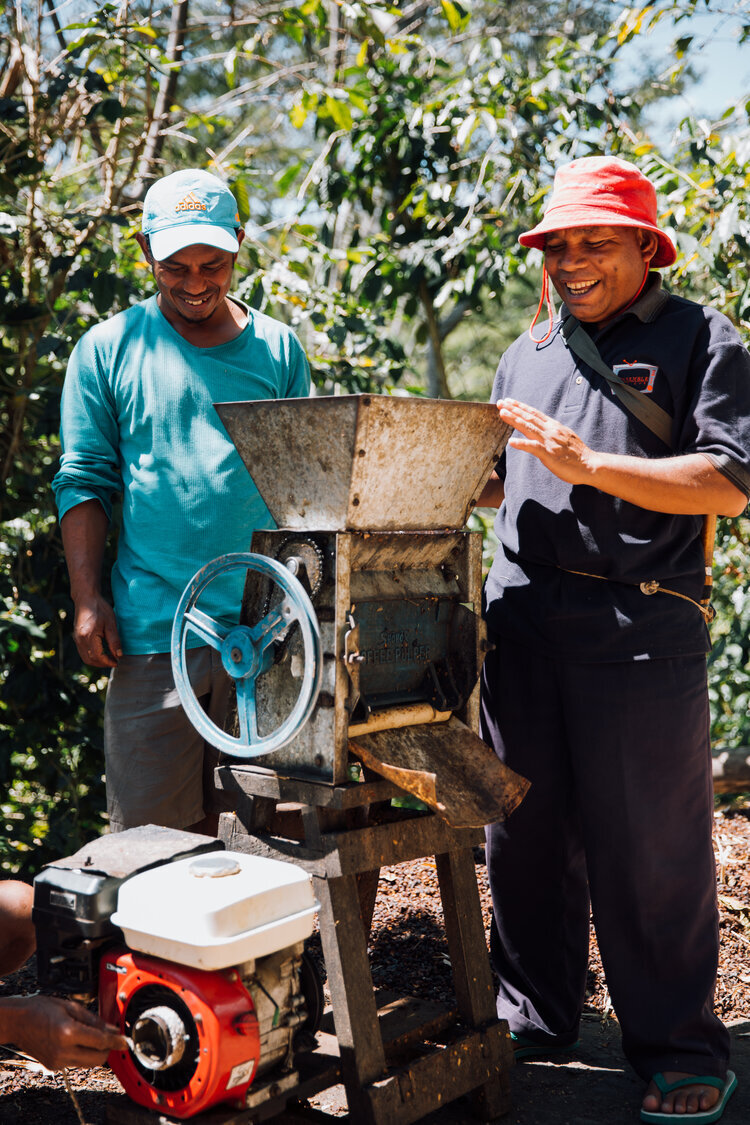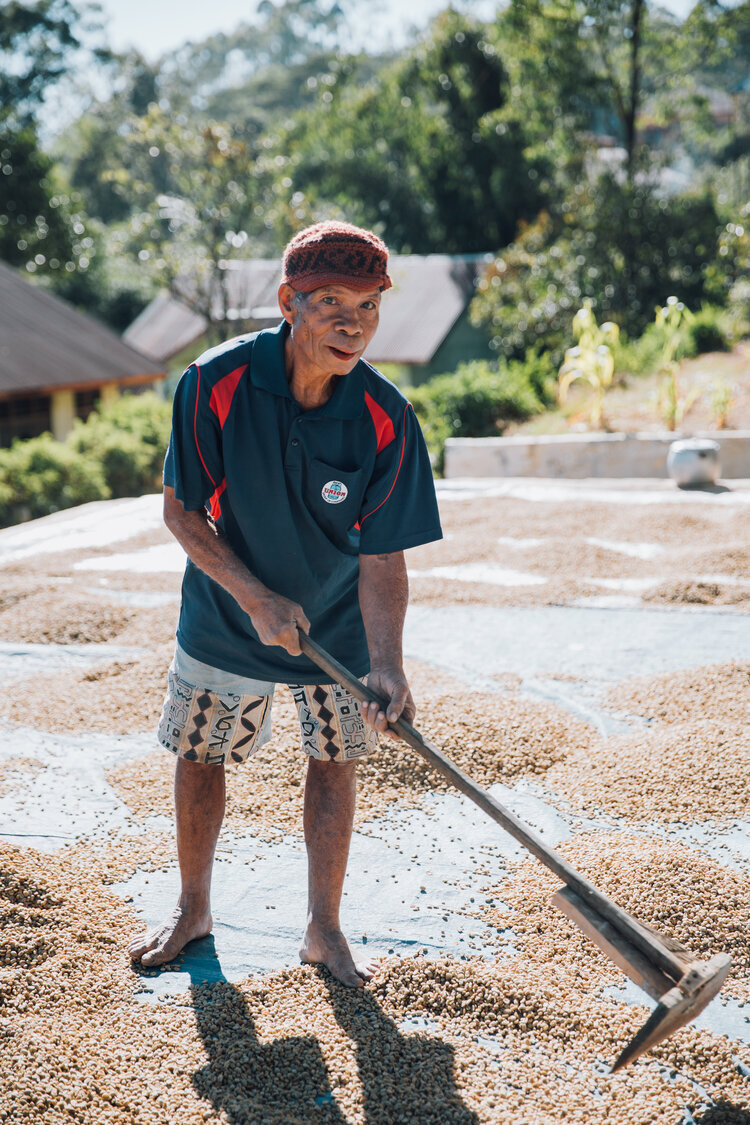personal coffee passport
Your coffee: traceability, flavor stability and producer impact
AFRICA - Rwanda
FARMS: 400 smallholders delivering to Intango Washing Station
LOCATION: Karongi District - Western Province, Rwanda
CULTIVARS: Arabica Bourbon: French Mission, Jackson, Mbirizi
EXPORTER: Roots Origins Inc.
IMPORTER: This Side Up Coffees
ROASTER: BYBO Coffee
OPERATOR: Selecta Netherlands
SOUTH AMERICA - Colombia & Brazil
FARMS: 20 independent farmers, connected by Argote Specialty Coffee in Colombia and 5 independent farmers in São Jerônimo da Serra in Brazil
LOCATION: Génova, Colón, Nariño, Colombia; São Jerônimo da Serra in Paraná, Brazil
CULTIVARS: Castillo, Caturra, Mundo Novo
EXPORTER: Argote Specialty Coffee; Capricornio Coffees
IMPORTER: This Side Up Coffees
ROASTER: BYBO Coffee
OPERATOR: Selecta Netherlands
rOBUSTA - INDONESIA
FARMS: First Light Farmer Group, totaling around 20 farms
LOCATION: Candiroto village, Temanggung, Central Java, Indonesia
CULTIVARS: Unique robusta varieties derived from uncontrolled cross-pollination
EXPORTER: Ontosoroh Coffee
IMPORTER: This Side Up Coffees
ROASTER: BYBO Coffee
OPERATOR: Selecta Netherlands
About the Rwandese Station
Intango (pronounced “Inango”) is a small washing station on the edge of Lake Kivu. Once part of a cooperative that won the 2014 Rwanda Cup of Excellence, it became run down as the cooperative dissolved. That is until our friend Gilbert Gatali took it over. Grown up in Canada but Rwandan by roots, Gilbert came back to his African roots as a coffee importer. He then continued to help hundreds of farmers improve their quality as manager of Rwanda's first farmer-owned specialty coffee export company. Finally, after 13 years of managing coffee quality indirectly, he and his best friend Gervais are fulfilling their dreams of running their own specialty coffee washing station. The washing station works with only 400 supplying farmers, but this gives Gilbert the oversight to make lasting impact for all of them.
About the Indonesian farms
Cahyo, founder of First Light coffee. Cahyo Pertama, whose name literally translates to First light is a 31 year old entrepreneur that is leading the youth movement from Candiroto village in the Temanggung district. Coffee has been part of his family although his parents have been spice traders all their life. Originally this village used to have excelsa variety that never really made the cut making robusta this region’s native species. Although coffee wouldn’t be the first choice for many of the youth that are part of his group, finding jobs that could pay bills was getting difficult. More of younger members came together to discuss this and see how they could help themselves find stable alternatives. Since most of them had coffee in their family and it was evident demand for higher quality coffee seemed promising. 20 of them together with Cahyo decided to give specialty coffee a try out of which roughly 10 of them were first time coffee planters. Incomes from coffee allowed them to also improve their ‘image’ in the society, it was profitable and doing it together enabled access to knowledge, resources easily. It is a robusta that clearly can change the bad reputation this variety has.
About colombia
In 2014, This Side Ups Lennart met Juan Pablo through a mutual friend. They hit it off immediately and a partnership was born. In the first year, we helped them obtain hulling equipment and an export license so they could sell this coffee straight to us. Less than two years later, they became independent exporters, created raised beds, helped their friends of the Muñoz family process and export their crop, and already seven groups of field baristas have helped to experiment with cascara, honey, natural, anaerobic processing, and much, much more. Since 2016 the washed crop was fermented, a great tweak that has made the coffee's sweetness more layered. In 2017 we began experimenting and upgrading with greater pace and in direct cooperation with roasters. 2018 brought about the first structural fermentation timing experiments, while in 2019 many of the farmers have spent their premiums on not just raised beds but raised drying “drawers” for maximum space efficiency. 2020 and 2021 saw the establishment of a training center for regenerative transition for any farmer who is interested. In 2022 and 2023 the processing craziness continues and there are even plans to start cacao production. With a mentality and a network like Argote’s, the sky truly is the limit.
About the brazilians
Capricornio coffees is located on the line of Capricorn (hence the name!) and therefore quite distant from the Equator, this means that winters are colder and average temperature is lower. The coffees will need to work harder to ripen, which increases the sweetness of the flavor, creating a very distinct coffee. This coffee is a blend especially prepared to achieve a composition of flavors full of fruit, vibrant complexity and a subtile body, and part of the Signature coffees line of the connected Capricornio farms. Signature coffees have taste profiles idealized and chosen by Capricornio Coffees director Luiz Roberto, and validated by the Quality Control team. The aim is to create taste profiles that are repeated every year, offering not only quality, but also consistency, that coffee drinkers recognize every year.
The blend - coffee specs
what to taste for
Flavor Stability
At least four times per year, the blend gets extensively tested, tasted and redesigned to guarantee a similar flavor profile all year round, whilst supporting a variety of coffee producers.
Aroma: chocolate, dried berries, slight citric notes, spices.
Body: round mouthfeel with a thick body.
Acidity: hint of orange, grape.
Aftertaste: white pepper, almond, honey.
PROCESSING your coffee
Colombian coffee is a fully washed coffee, meaning the cherries hand-picked, de-pulped, washed with mountain water, fermented for 18-24 hours, sun-dried on concrete patios and on raised “drawers” with high airflow for about 2 weeks, manually sorted at the farm in four separate rounds, hulled and bagged at the Argote family farm. The Brazilian coffee is a pulped natural. The combination of altitude and processing results in a jammy, red fruit profile, with lots of sweetness and a dark chocolate backbone. The Rwandese coffee is a washed arabica coffee. The combination of altitude and processing results in a fresh, citric and fruity profile, with lots of sweetness and a hint of acidity. The Indonesian coffees are natural processed robustas, giving it a very round, sweet and spicy taste, without the hints of tar and rubber so often associated with this type of coffee.
ROASTING YOUR COFFEE
BYBO Coffee uses modern, highly energy efficient hot air roasters with an inbuilt afterburner, leading to lower CO2 emissions than conventional roasting. The machinery uses state of the art roasting software, controlled by a skilled roast master. The roast time is around 10 minutes. After the first crack, the coffee is roasted for a remainder of 25% of the time. All three the coffees are roasted separately, and mixed afterwards, to obtain the best flavor through the individual roast profiles and guaranteeing full traceability from bean to cup.
PRICE BREAKDOWN
€5.37 per kg
is what the farmers get (average of the three origins) for the green coffee price, stated as “FOB” or Free on Board. This is for growing, harvesting, milling and getting the bags onto the ship. Proof and exact price build-ups can be found below.
€1.35 per kg
importing costs. This is customs fees, insurance, warehousing charges, quality control, financing, and regular contact with the producers, all to be done by This Side Up Coffees.
€0.20 per kg
shipping from the Rotterdam warehouse to the BYBO Coffee roastery in Amsterdam.
€1.37 per kg
roasting loss. When you roast green beans, around 15-20% of the mass evaporates. This means that 1kg of green coffee turns out to be 800grams of roasted coffee, which you need to “fill”.
€2.98 per kg
Remuneration for the roasting of the coffee by BYBO coffee. This means running the factory, roasting the coffees to their best quality, paying off the machinery, packaging the coffees and more.
€11.27 per kg
Total price for which the coffees leave the roastery, to be handled by Selecta.
The contracts - proving the price
When you treat your partners as equal entrepreneurs and pay them accordingly, you’re proud of this relationship and you might as well show it all. Attached the buying contract for the three farms, which correspond to the prices allocated to the farmers + exporting partners in the three respective countries. A little legenda:
€1,00 is $1,08 (per 2024)
1 kg is 2,2 lbs (American pound)
To establish a good benchmark, we used the criteria put out by the advice of RVO, the Netherlands Enterprise Agency:
“During the entire term of the Agreement, the coffee producer shall at all times receive at least the applicable Fairtrade Minimum Price per pound minus 25% + the applicable Fair Trade Premium per pound + the applicable Organic premium per pound (Organic Differential) + the additional RWS premium per pound (towards a living income) of ad. $ 0.30.”
Taking this calculation, for the arabica coffees (Rwanda, Uganda and Ethiopia) we have a Fairtrade Minimum Price of $1.40/lbs, minus 25% + the applicable Fair Trade Premium ($0.20/lbs) + the applicable Organic premium per pound ($0.30/lbs) + the additional RWS premium ($0.30/lbs) = $1.85/lbs or €4.08/kg.
For the robusta coffee (Indonesia and India) the Fairtrade Minimum Price is $1.05/lbs, minus 25% + the applicable Fair Trade Premium ($0.20/lbs) + the applicable Organic premium per pound ($0.30/lbs) + the additional RWS premium ($0.30/lbs) = $1.59/lbs or €3.51/kg.
Rwanda, roots intango (washing station)
2022/2023 HARVEST
This year, due to shortages in the international coffee community but especially the central and East African region, prices went up considerable to $5.50/kg. Also this year, logistics costs are high and inflation in also the producing countries play a role. This equals a price of €5.09 per kg against the exchange rate of that moment.
Indonesia, first light farmer group (candiroto village) and Ontosoroh (exporter)
2023/2024 HARVEST
We paid Ontosoroh Coffee €4.80 per kg for the coffee from the Candiroto farmers, for which Ontosoroh did the milling and exporting process.
brazil, SÃO JERÔNIMO DA SERRA GROUP AND capricornio coffees (exporter)
2023/2024 HARVEST
Prices are represented in per bag price, respectively $340 per 60 kg. This equals a price of US$5,66 per kg or €5.24 per kg
Colombia, argote specialty coffee (farmers and exporter)
2023/2024 HARVEST
Colombian prices are high, due to increased international demand for the sublime quality. Prices averaged US$9,46 per kg for the washed coffees. This corresponds to €8,76/kg. In the blend, only a smaller percentage of this coffee is used.
AVERAGING THE BLEND
The blend consists of 40% robusta, 30% African coffees and 30% South American coffees (of which 20% Brazil and 10% Colombia). Averaging the price, this ends up being €5,37/kg for the green unroasted coffee. This is far above the benchmark set by RVO, the Netherlands Enterprise Agency.
Notables about the individual origins
Next to having a traceable coffee of farmers that received the right price, it’s important to keep developing. We’re doing this with all three producer communities, and present a few notable facts.
RWANDA
Founder and CEO Gilbert, has a long track record in the international Specialty Coffee industry, with working experience in diverse high end North American firms. With this experience, quality and market demand connectivity are in good hands. Nowadays, Gilbert is also president of the African Specialty Coffee Association.
Only in 2019 the naturals were introduced, which now are amongst This Side Ups best performing and highest scoring coffees.
COLOMBIA
Every year, a “Field Barista Trip” is organized, allowing baristas and roasters from Europe to participate in the picking, harvesting and processing season at the farm. You can read more about this here.
This Side Up, together with MVO Nederland, the German government via GIZ and local partners, have established a training center for farmers to go from conventional to organic farming. This includes making their own fertilizers on site, and much more. More can be read here.
Our Colombia lots are so called nano-lots, of which as little as 35 kg bags can be traced to the exact farm and farmer. The names of the farmers are written on the coffee bags, allowing for an extreme sense of traceability.
INDONESIA
A youth group in Candiroto village produces speciality robusta for their main source of income and more than 10 of them are first time coffee planters
Coffee farming as an alternate source of employment which has allowed empowerment within the community bringing together like minded folks to produce high quality coffee
Sense of pride due to profitability from coffee farming and enables access to knowledge, resources far easier since they do it together
Farmers grow coffee in an agroforestry way by making use of shade grown trees and using organic fertilizers for their coffees
For the upcoming years focus in on productivity, process innovations and quality control
BRAZIL
The Signature blends might vary annually in composition, the farmers that deliver the coffees, do not. We proudly support two estates, being Fazenda California and Fazenda Fronteira, and two farmer groups, being the Women in Coffee and the farmers of São Jerônimo da Serra. Their individual stories can be read here.
Capricornio greatly reduces the ecological footprint of all their 20 partner farmers: they help them create water-efficient mills, implement waste water treatment technologies, and apply systems thinking to optimise all coffee processes and reduce CO2 output. They also stimulate the use of organic fertilisers, energy-efficient machinery and irrigation systems.
In 2022, Luiz, one of the owners of both Capricornio and Fazenda California, is elected as the first-ever farmer to become a board member in the prestigious world wide SCA (Specialty Coffee Association).
Copyright on pictures. Please consult This Side Up Coffees if one desires to use the pictures for commercial and non-commercial purposes.









